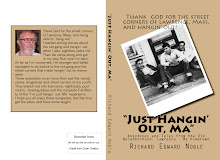America’s Nazi Secret
By John Loftus
Book review
By Richard E. Noble
This is my second adventure into the world of espionage and Nazi hunting with John Loftus.
Make no mistake, this is a very confusing and deceptive business with agents, double agents, triple agents, counter spies, terrorists and most frightening of all, U.S. government agencies. Mr. Loftus is not appreciated in the world of governments. His books have all been censored for years. He was warned with the threat of imprisonment not to print certain information in his possession thirty years ago and has been restricted accordingly.
In this book Mr. Loftus takes on the Justice Department, the CIA, the OSS, the DoD, the State Department, several presidents and numerous bigwigs in the business of espionage and spying. He names names and gives addresses. There is no doubt in this reader’s mind that this author’s life and that of his family has been under constant threat for many years of his adult life. He is playing with some of the worst people on the planet. He is one of a small handful of writers who have taken up the justifiable cause of exposing Nazis in the United States and around the world. This is a mighty scary business but yet he remains very civil and extremely understanding of people and their mistakes.
The philosophies of Nazism and fascism are philosophies of guiltless slaughter.
Unlike socialism and communism which are based on idealistic, utopian principles that have been corrupted by unscrupulous individuals, Nazism has no idyllic base. It is a declared philosophy of unconscionable acquisition, genocide and murder. I know of no other political philosophy as horrendous and deserving of suppression.
I see no political prejudice in this author’s work. He is harsh to both sides but mostly to individuals.
Certain names keep reappearing in these books: the Dulles Brothers, Gehlen, John J. McCloy, Wisner, Cheney, Bush, Bohlen, William Casey, the Carlisle Group, Averell Harriman, George Kennan, Joe McCarthy, Henry Kissinger, General Patton, Ronald Reagan, Radio Free Europe, Rockefeller, Harold and Kim Philby, William Donovan, Edward, the Duke of Windsor and others.
“Of the 15,000 Nazi war criminals officially estimated to have lived in America, fewer than one hundred received any form of mild sanction from the Justice Department, and that at the staggering cost of more than a half-million dollars per case. Congress had delivered the money, but Justice never delivered the goods. Nazi hunting may have been the least effective program in Justice Department History.”
This lack of efficiency does not seem to be totally bureaucratic or institutional but contrived and purposeful. Most folks dismiss all this lack of desire to capture and bring ex-nazi war criminals to justice to the Cold War mentality. But the more I read it seems much more complicated. There is more to this negligence than simple anti-communism.
“…the Muslim Brotherhood was the original Arab Nazi movement, working for the British intelligence to crush the infant state of Israel. In the 1980s it was hired by American intelligence to recruit the Mujahadeen in Afghanistan, and it is now the parent organization of every Sunni terrorist group in the Middle East.”
The point that there is an Arab/Nazi connection in this Middle East situation does not get very much attention or consideration when discussing Middle East problems. But the Arab nations supported Adolf Hitler and his Nazis and the Axis cause during World War Two.
We hear much more about Lawrence of Arabia and his little band of pro-western supporters than about a whole world of Arab Nazi enthusiasts. Not too much is written or reported on the great bulk of Arab nations and their connection to Nazism.
In our own home politics much is made of the connections of the left to socialism and communism but the obvious links of conservatives to fascism, Nazism and totalitarianism are very rarely discussed.
In this book the author concentrates on the Belarus area of Russia.
Once it was successfully occupied by German forces during WWII large segments of the Byelarussian population turned against their own people and became active, willing and supportive of the Nazi intruders.
They joined enthusiastically in the slaughter of their own. They participated in the Nazi occupation government. Certain among them organized mass executions of area Jews, slaughtering as many as five thousand in one incident. They turned in their neighbors, worked in the prisons and extermination camps and apparently relished their new dominance and power over and their fellow citizens. They formed armies and fighting organizations who fought shoulder to shoulder and side by side with the
Nazis. They were traitors and collaborators.
After World War II they were reorganized into paramilitary groups by US intelligence agencies to prepare for the predicted and inevitable war with Russia. For the most part this was accomplished by a man named Wisner who was a leader and power broker in the US intelligence organization.
The Byelarussians were incorporated into spying networks and as time went on many, thousands, were smuggled into the United States under one guise or another.
The author presents detailed documentation of how certain of these war criminals were brought to the United States and granted citizenship with complete government knowledge of their heinous war crimes.
He wants the victims of these murders to receive justice and the government agencies and individuals involved in these cover-ups to be investigated and appropriate penalties applied.
He fingers individuals like Emanuel Jasiuk, Jury Sobolewsky, Anton Adamovitch, Mykola Lebed, Radoslaw Ostrowsky, Franz Kushel, and Mikolai Abramtchik.
The author brings to the table a completely different point of view.
Typically we see the threat to America and the American way of life via communism. This author sees the more realistic and vile threat of Nazism.
Since World War II ended and the Nazis’ plan for world domination defeated, America has dismissed the Nazi problem as a threat as if all the Nazis have been dead and buried. This author indicates that Nazism is alive and well and prominent in the Middle East and dominant among certain Arab groups, the Muslim Brotherhood in particular. It is alive also in South America and in the United States and Canada.
The author closes his book with this insight and his personal positive scientific prediction.
“Arab terrorism will continue as long as we continue to import Arab oil. A group of us in a group called Liquid Light, are preparing a bit of a shock for the Arabs. We have found a way to manufacture the Holy Grail of Alternative Energy, the Indium Gallium Nitride Solar cell (InGaN). Not only does this InGaN solar cell use 100% of the sun’s bandwidth (as opposed to 20% for existing cells) but it can be manufactured so cheaply that an InGaN solar cell can produce electricity at two cents per kilowatt hour versus 10-15 cents per KWH for a carbon based power plants.
“The long dark night of corporate corruption of the Justice Department may be coming to an end.”






















































